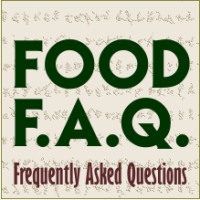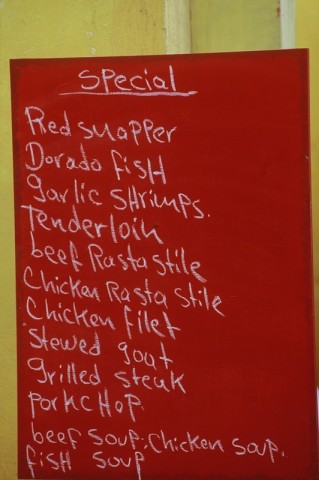[title type="h5"] Joe writes: [/title]
[dropcap1]D[/dropcap1]on’t you think it would be nice if all restaurants would let their staff announce the prices of their specials as they read them off? They do so on the menu visually, so why not when they tell you verbally? We have felt (and more than just felt, it’s actually happened) that we have been ripped off by not knowing the price of verbal specials and when we get the bill, the charge is a lot higher than most or all of the fare on their printed menu. We should start a movement to encourage restaurants to do this. If you disagree, please tell me why.
[dropcap1]T[/dropcap1]he reason that waiters in most restaurants don't automatically give the price of specials is that most people who dine in restaurants ambitious enough to have specials are mildly offended when the price is given. It comes across as suggesting that the customer might not have enough money to pay for the dish, or that the diner is primarily interested in a low price rather than culinary excellence. The main reason people go out to dine is to be more luxurious than staying at home. At home, you eat leftovers and simple food. When you're out, you're in celebration mode, even if it's a restaurant you go to all the time.
You may not believe that what I say is true, but I can prove it. Find ten restaurants that verbally give the prices for the specials, and you will see that most of them are low-price, neighborhood restaurants. Few or none of them will be upscale places.
Joe writes: [/title]
[dropcap1]D[/dropcap1]on’t you think it would be nice if all restaurants would let their staff announce the prices of their specials as they read them off? They do so on the menu visually, so why not when they tell you verbally? We have felt (and more than just felt, it’s actually happened) that we have been ripped off by not knowing the price of verbal specials and when we get the bill, the charge is a lot higher than most or all of the fare on their printed menu. We should start a movement to encourage restaurants to do this. If you disagree, please tell me why.
[dropcap1]T[/dropcap1]he reason that waiters in most restaurants don't automatically give the price of specials is that most people who dine in restaurants ambitious enough to have specials are mildly offended when the price is given. It comes across as suggesting that the customer might not have enough money to pay for the dish, or that the diner is primarily interested in a low price rather than culinary excellence. The main reason people go out to dine is to be more luxurious than staying at home. At home, you eat leftovers and simple food. When you're out, you're in celebration mode, even if it's a restaurant you go to all the time.
You may not believe that what I say is true, but I can prove it. Find ten restaurants that verbally give the prices for the specials, and you will see that most of them are low-price, neighborhood restaurants. Few or none of them will be upscale places.
 Three other points. 1. Restaurants that have printed cards with their daily specials almost always include the prices on those cards. It's only when the menu is verbal this the effect above takes place. But listen to this: having the cards seems to have the effect of making the prices of specials a little higher than they would be with a verbal menu. That's because there is no possibility of embarrassing a customer who reads the prices instead of hearing them.
B. All of these issues began to be seen in the 1970s, when the function of daily specials changed. Before 1972 or so, restaurant specials were almost always motivated by a lower price. They were essentially on sale--marked down to get people excited about spending less money. But during the 1970s the specials began to be about unusual ingredients or special recipes, most of which actually cost more than the old, on-sale-prices used to be. This confused a lot of people for a long time, but I don't hear about it much anymore. Most diners have become accustomed to the idea that specials are almost always more expensive than regular-menu prices.
iii. There is no shame in asking for the price of anything in a restaurant (or in any other business). You should never buy anything without knowing the price, any more than you should ever give someone a signed, blank check. Tom's Law #5254-C: Never, ever say the following sentence in a restaurant: "Bring me the best Cognac in the house!" It might be priced at over $100 a shot.
Three other points. 1. Restaurants that have printed cards with their daily specials almost always include the prices on those cards. It's only when the menu is verbal this the effect above takes place. But listen to this: having the cards seems to have the effect of making the prices of specials a little higher than they would be with a verbal menu. That's because there is no possibility of embarrassing a customer who reads the prices instead of hearing them.
B. All of these issues began to be seen in the 1970s, when the function of daily specials changed. Before 1972 or so, restaurant specials were almost always motivated by a lower price. They were essentially on sale--marked down to get people excited about spending less money. But during the 1970s the specials began to be about unusual ingredients or special recipes, most of which actually cost more than the old, on-sale-prices used to be. This confused a lot of people for a long time, but I don't hear about it much anymore. Most diners have become accustomed to the idea that specials are almost always more expensive than regular-menu prices.
iii. There is no shame in asking for the price of anything in a restaurant (or in any other business). You should never buy anything without knowing the price, any more than you should ever give someone a signed, blank check. Tom's Law #5254-C: Never, ever say the following sentence in a restaurant: "Bring me the best Cognac in the house!" It might be priced at over $100 a shot.
Written by Tom Fitzmorris November 13, 2015 11:01 in